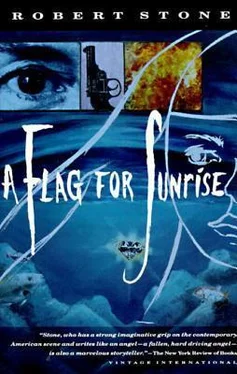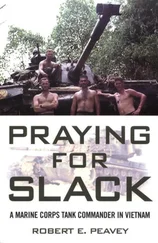Robert Stone - A Flag for Sunrise
Здесь есть возможность читать онлайн «Robert Stone - A Flag for Sunrise» весь текст электронной книги совершенно бесплатно (целиком полную версию без сокращений). В некоторых случаях можно слушать аудио, скачать через торрент в формате fb2 и присутствует краткое содержание. Год выпуска: 2012, Издательство: Vintage, Жанр: Современная проза, на английском языке. Описание произведения, (предисловие) а так же отзывы посетителей доступны на портале библиотеки ЛибКат.
- Название:A Flag for Sunrise
- Автор:
- Издательство:Vintage
- Жанр:
- Год:2012
- ISBN:нет данных
- Рейтинг книги:4 / 5. Голосов: 1
-
Избранное:Добавить в избранное
- Отзывы:
-
Ваша оценка:
- 80
- 1
- 2
- 3
- 4
- 5
A Flag for Sunrise: краткое содержание, описание и аннотация
Предлагаем к чтению аннотацию, описание, краткое содержание или предисловие (зависит от того, что написал сам автор книги «A Flag for Sunrise»). Если вы не нашли необходимую информацию о книге — напишите в комментариях, мы постараемся отыскать её.
A Flag for Sunrise — читать онлайн бесплатно полную книгу (весь текст) целиком
Ниже представлен текст книги, разбитый по страницам. Система сохранения места последней прочитанной страницы, позволяет с удобством читать онлайн бесплатно книгу «A Flag for Sunrise», без необходимости каждый раз заново искать на чём Вы остановились. Поставьте закладку, и сможете в любой момент перейти на страницу, на которой закончили чтение.
Интервал:
Закладка:
They drove on in silence over the dusty plateau. The coastward volcano was abreast of them, a second, larger rose ahead. To Holliwell, they seemed freakish mountains; only malignant gods could inhabit or inform them. They rose solitary out of featureless tableland, bare, without harmony, unbeautiful enough to appear exactly what they were — burst excrescences on Tecan’s pocked dusty hide. A geology lesson, he thought. They communicated a troubling sense of the earth as nothing more than itself, of blind force and mortality. As mindlessly refuting of hope as a skull and bones. The landscape was a memento mori, the view ahead like a dead ocean floor.
“Scary,” Holliwell said.
Tom and Marie laughed.
“We thought it was only us,” Marie said.
“The Tecanecans are very big on their volcanoes,” Tom told Holliwell. “They’re on the flag and the national seal. They run up and down the country along a fault. First thing a local will ask you when you come in-country is whether you’ve seen the volcanoes or not.”
“Key-to-the-country kind of thing?”
“I never had it put that elaborately,” Tom said. “I don’t think anyone here thinks they’re the key to the country. They’re just big things for turistas to gawp at. I mean they’re there and they’re huge and uniquely Tecanecan, so the Tecs are proud of them. It’s their duty to be.”
“What does the national poet say? Is he on about them?”
“They don’t have a national poet to speak of. They never had a Rubén Darío in Tecan. Never saw the need of one.”
“There’s a verse about the volcanoes in the national anthem though,” Marie said. “I can’t remember how it goes. It’s pretty trite.”
“The first movement of Brahms’ First,” Tom told them. “That’s the national anthem. Moving as hell. In the old days before the Marines came the Tecanecan Army could goose-step to it. The Marines made them knock it off.”
They began to pass more buses on the road. The number of dirt roads with signs indicating villages off the road increased.
Tom slowed down, wary of children and cattle on the highway, sounding his horn at turns to warn the burro carts that appeared more and more often now as they approached the capital. From time to time, they passed a lone Indian bent under a load of firewood. People looked down at the dirt as the car sped by them.
“What I wonder,” Bob Cole said in his strange tremulous voice, “is whether the people down here have to live this way so that we can live the way we do.”
“I’m just a soldier,” Zecca said. “But I think the answer to that is no. It sounds too simple to me.”
“But it’s not a simple question,” Marie said brightly. “It’s a really complicated one.”
Cole turned to Holliwell.
“How about you, sir? You’re something of an expert. What do you think the answer is?”
“I have to confess,” Holliwell said, “that I haven’t figured that out. There are lots of gaps in my expertise. I don’t know what the answer is.”
“We have to believe it’s no, don’t we?” Cole asked. “We couldn’t face up to it otherwise. Because if most of the world lives in this kind of poverty so that we can have our goodies and our extra protein ration — what does that make us?”
“It makes us vampires,” Holliwell said. “It makes us all the cartoon figures in the Communist press.”
“What if you found out it were true?”
“Me? What I do doesn’t matter. I’d go on doing what I’m doing.”
“How about you, Captain?”
Zecca took one hand from the wheel and turned partway around toward Cole. Marie kept her eyes on the road.
“What are you, Mr. Cole?” Captain Zecca asked. “Some kind of an agitator?” He asked the question humorously, with more of Toledo in his voice than he usually permitted.
“Not at all,” Cole said.
At the approaches to the Tecanecan capital of San Ysidro, the Pan-American Highway wound down in switchbacks from the high desert into a lush tropical plain beside a great lake. As they started the descent, the sun hung over the low hills of the coffee country and the contours of the two visible volcanoes softened to show Holliwell a more insidious menace. They were running late. After sundown, the inter-capital truck traffic would be on the road — a mortal risk.
“When you were in Vietnam,” Holliwell asked Cole, “what did you do there?”
In the expectant silence that filled the car, Cole seemed to force an answer.
“I was in the Army,” he told them. “In the Army there for three years because I extended.”
“Is that right?” Zecca said.
“I started with an infantry platoon, a second lieutenant. Then I was on staff, with intelligence. Then later … I went back. With AID. And then I went back again as press, free-lancing.”
“You must have liked it there,” Zecca said.
“In a way,” Cole said, “I liked it very much.”
The captain smiled thinly.
“It held a fascination for you. A kind of moral fascination, am I right?”
“Well …” Cole began. “Yes,” he said.
“I can understand that very well. Right, Marie?”
“Sure,” Marie said. “A lot of our friends were like that. We were a little like that too, weren’t we?”
“We sure were,” Tom said. “And we were courting, so that lent color to our moral fascination.”
“I never found time to go courting,” Cole told him.
“Too bad,” Zecca said. “You find time to get laid? Or weren’t you interested?”
“Sexist talk,” Marie hissed softly. “Jeez.”
Holliwell asked Cole if he had been much in the delta. He had been. He had been out to the island and met the coconut monk.
“He’s in jail now, that guy,” Tom said. “They locked him up.”
“That’s a mistake if it’s true,” Cole said.
“It’s true,” Holliwell found himself saying. “And they didn’t lock him up by mistake. They know what they’re doing.”
“Fucking-A,” Zecca said.
Holliwell asked Cole if he had been much in the delta. He had been. He had been out to the island and met the coconut monk.
“He’s in jail now, that guy,” Tom said. “They locked him up.”
“That’s a mistake if it’s true,” Cole said.
“It’s true,” Holliwell found himself saying. “And they didn’t lock him up by mistake. They know what they’re doing.”
“Fucking-A,” Zecca said.
Cole only shrugged and looked more unhappy.
Fields of bananas grew on the slopes above San Ysidro, introduced there from the east coast. The town below was a white seaport city with the lake doing duty as ocean. It was a lake twice the size of the Lago Azul but lifeless from four hundred years of ill use. Its surface was still and dark. The declining sun had passed over it.
They drove past a summerhouse among the young banana trees, a pocket villa hung with Japanese lanterns. Below them, a mile or so from the foamy edge of the lake, was a reservoir, surrounded by a cement wall.
“The Marines put that in during the nineteen thirties,” Zecca told them. “You can drink the water here. Only drinkable water between El Paso and God knows where.”
“That at least,” Marie said. “So our presence here hasn’t been all bad news.”
Cole stirred in his seat, his thoughts apparently fixed on the coffee country. Holliwell lit a cigarette.
Entering the capital, the Pan-American Highway made a brief promenade into town, running along the lakefront past several blocks of crumbling, incongruously Victorian mansions and lit by cast-iron streetlamps of antique Parisian design. After less than half a mile of this, it broke up into unpaved narrow streets.
San Ysidro, in its tuck of the lake valley, was losing the light. The cramped streets near the lake were suddenly dark, scantily lighted, but alive with the din of a half-seen crowd. Driving slowly, Zecca put his head out of the car window to see past the screen of dust and crushed insects that fouled his windshield.
Читать дальшеИнтервал:
Закладка:
Похожие книги на «A Flag for Sunrise»
Представляем Вашему вниманию похожие книги на «A Flag for Sunrise» списком для выбора. Мы отобрали схожую по названию и смыслу литературу в надежде предоставить читателям больше вариантов отыскать новые, интересные, ещё непрочитанные произведения.
Обсуждение, отзывы о книге «A Flag for Sunrise» и просто собственные мнения читателей. Оставьте ваши комментарии, напишите, что Вы думаете о произведении, его смысле или главных героях. Укажите что конкретно понравилось, а что нет, и почему Вы так считаете.












